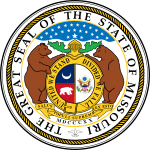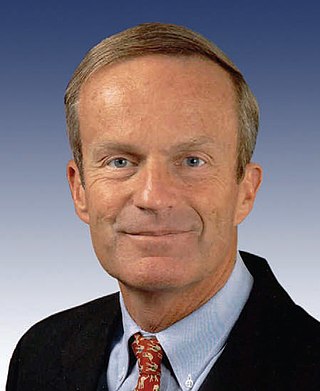
William Todd Akin was an American politician who served as the U.S. representative for Missouri's 2nd congressional district from 2001 to 2013. He was a member of the Republican Party. Born in New York City, Akin grew up in the Greater St. Louis area. After receiving his bachelor's degree from Worcester Polytechnic Institute in Massachusetts, Akin served in the U.S. Army Corps of Engineers and worked in the computer and steel industries. In 1988, he was elected to the Missouri House of Representatives. He served in the state house until 2000, when he was elected to the U.S. House of Representatives, in which he served until 2013.

The 1970 United States Senate elections was an election for the United States Senate. It took place on November 3, with the 33 seats of Class 1 contested in regular elections. Special elections were also held to fill vacancies. These races occurred in the middle of Richard Nixon's first term as president. The Democrats lost a net of three seats, while the Republicans and the Conservative Party of New York picked up one net seat each, and former Democrat Harry F. Byrd Jr. was re-elected as an independent.

The 1958 United States Senate elections were elections for the United States Senate which occurred in the middle of President Dwight D. Eisenhower's second term. Thirty-two seats of Class 1 were contested in regular elections, the new state of Alaska held its first Senate elections for its Class 2 and 3 seats, and two special elections were held to fill vacancies.

The 1914 United States Senate elections were held on November 3, 1914. These were the first regularly scheduled elections held following the ratification of the Seventeenth Amendment to the United States Constitution in 1913, which required that all seats up for election be popularly elected, rather than chosen by their state legislatures. Thus, it was the first time that elections were generally scheduled on Election Day to coincide with the U.S. House elections. The 32 seats of Class 3 were contested in regular elections in 1914. Special elections were also held to fill vacancies. These elections occurred in the middle of Democratic President Woodrow Wilson's first term.

The 1926 New York state election was held on November 2, 1926, to elect the governor, the lieutenant governor, the state comptroller, the attorney general, a U.S. Senator, the chief judge and an associate judge of the New York Court of Appeals, as well as all members of the New York State Assembly and the New York State Senate. A referendum to repeal Prohibition was also proposed and accepted by a very large majority.
The 1914 Arkansas Razorbacks football team represented the University of Arkansas during the 1914 college football season. Earle T. Pickering was the team's head coach for his second and final season. The Razorbacks compiled a 3–6 record and were outscored by their opponents by a combined total of 202 to 104.
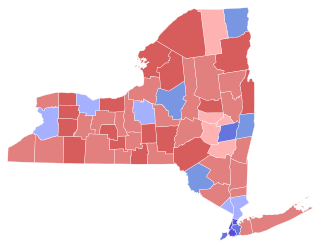
The 1932 New York state election was held on November 8, 1932, to elect the governor, the lieutenant governor, the state comptroller, the attorney general, the chief judge, a U.S. Senator and two U.S. Representatives-at-large, as well as all members of the New York State Assembly and the New York State Senate.

The 2012 United States Senate election in Missouri was held on November 6, 2012, concurrently with the 2012 presidential election, other elections to the United States Senate in other states, as well as elections to the United States House of Representatives and various state and local elections.

The 1932 United States Senate election in Missouri took place on November 8, 1932, in Missouri. Incumbent Democratic Senator Harry B. Hawes did not seek re-election, and Democratic candidate Bennett Champ Clark was elected with 63.26% of the vote over former Mayor of St. Louis Henry Kiel. Clark slightly underperformed Franklin D. Roosevelt, who won 63.69% of the vote in the presidential election. He also notably carried the exact same counties Roosevelt carried in the Presidential Election
Charles Lewis Hill was an American politician who, during 1910s, received the Prohibition Party nominations for Wisconsin governor and senator.
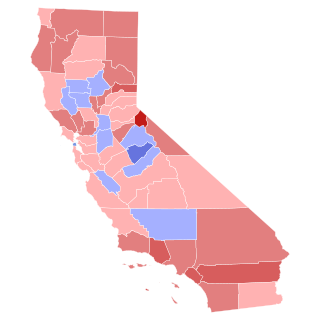
The 1920 United States Senate election in California was held on November 6, 1920. Incumbent Democratic Senator James Duval Phelan ran for re-election but was defeated by Republican attorney Samuel Morgan Shortridge.
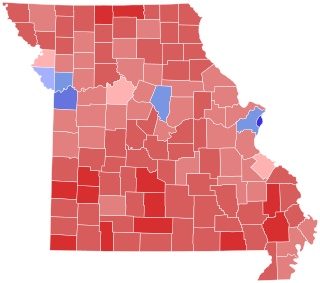
The 2016 United States Senate election in Missouri was held on November 8, 2016, to elect a member of the United States Senate to represent the State of Missouri. It was held concurrently with the 2016 U.S. presidential election, as well as other elections to the United States Senate in other states, elections to the United States House of Representatives, and various state and local elections. The primaries were held on August 2.

The 1938 United States Senate election in Missouri took place on November 8, 1938 in Missouri. The incumbent Democratic Senator, Bennett Champ Clark, was re-elected with 60.69% of the vote. He defeated Republican candidate and former Governor of Missouri Henry S. Caulfield.
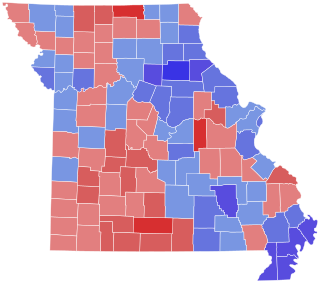
The 1956 United States Senate election in Missouri took place on November 6, 1956 in Missouri. The incumbent Democratic Senator, Thomas C. Hennings Jr., was re-elected. He defeated Republican nominee Herbert Douglas, winning 56.4% of the vote. Hennings outperformed Democratic presidential nominee Adlai Stevenson II, who won 50.1% in the presidential election in Missouri.

The 1950 United States Senate election in Missouri took place on November 7, 1950 in Missouri. Incumbent Republican Senator Forrest C. Donnell ran for a second term in office but was defeated by Democratic nominee Thomas C. Hennings Jr.

The 1916 United States Senate election in Missouri was held on November 7, 1916. Incumbent Democratic U.S. Senator James A. Reed was re-elected to a second term over Republican Walter S. Dickey.

The 1926 United States Senate election in Indiana took place on November 2, 1926. Incumbent Republican Senator James E. Watson was re-elected to a second full term in office over Democratic attorney Albert Stump.

The 1926 United States Senate election in Missouri took place on November 2, 1926 in Missouri. The Republican Senator elected in 1920, Selden P. Spencer, died on May 16, 1925. George Howard Williams was appointed to continue Spencer's term on May 25, and ran for a full term in this election. He was defeated by the Democratic nominee Harry B. Hawes, who won 51% of the vote. Hawes also defeated Williams in the special election held the same day.
Glenn V. Dawson is an American politician who served as a Democratic member of the Illinois House of Representatives from 1979–1980 and the Illinois Senate from 1980–1987.

The 1912 Illinois gubernatorial election was held on November 5, 1912. Incumbent second-term Republican governor Charles S. Deneen was defeated by Democratic nominee, former mayor of Chicago Edward Fitzsimmons Dunne.

